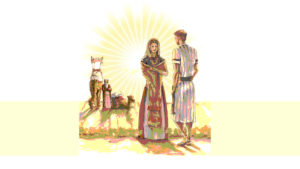Abraham Sends for a Wife for Isaac
 In the previous study, I developed the revelation of the “special son” drawing the parallel between what Abraham did with Isaac and with what God did with Jesus some 2,000 years later. That revelation continues in Genesis 23-25. We get a clue as to the age of Isaac when he was brought to Mt. Moriah to become an “olah” (special consecrated offering) to God. Secondly, the story of how the father obtains a bride for his son is told.
In the previous study, I developed the revelation of the “special son” drawing the parallel between what Abraham did with Isaac and with what God did with Jesus some 2,000 years later. That revelation continues in Genesis 23-25. We get a clue as to the age of Isaac when he was brought to Mt. Moriah to become an “olah” (special consecrated offering) to God. Secondly, the story of how the father obtains a bride for his son is told.
We ask the question, how old was Isaac when he was brought to Mt. Moriah by Abraham? Genesis 22:5 describes Isaac as a “na-ar” (נַעַר). This term is translated as lad (NAS) which means, simply, “a young man”. Most often, this expression is understood to mean “a teenager” or perhaps an even younger boy. The Biblical use of this term includes young men in their twenties or thirties. I will cite two references: firstly, Benjamin was referred to as a “naar” at age 32 (Genesis 43:8); secondly, Joshua was referred to as a naar at age 40 at Mt. Sinai (Exodus 33:11). Given these examples, I return to the question of how old was Isaac when he was almost sacrificed at Mt. Moriah. The Bible does not specifically tell us; however, the next event included in the Biblical account was Sarah’s death. She died at the age of 127 which means that Isaac was 37. I believe that the events described in Genesis 22 and 23 are not displaced very much in time. Therefore, I will speculate that Isaac was near 37 when Abraham brought him to Mt. Moriah. How does this correspond to the record concerning Jesus’ crucifixion 2,000 years later? Most scholars believe that His death occurred in 31 AD/CE. Luke stated that He was “about 30” at the beginning of His ministry. According to modern reckoning, Herod the Great died in 4 BC/BCE. Herod attempted to murder Jesus by killing the children in Bethlehem that were two years old or younger. Therefore, we conclude that Jesus was born between 6 and 4 BC/BCE. So Jesus would have been about 37 as the time of His crucifixion, which would correspond to the age of Isaac when He was brought to Mt. Moriah.
A Bride for the Special Son
Three years after Sarah’s death, Abraham sent his most trusted servant back to the homeland of his countrymen to seek a bride for Isaac. The servant looked for three primary qualities in the bride. She should be a virgin (this is understood), she must be a servant and she must be willing to leave everything familiar in her life and embark upon an unknown journey to respond to the call of her groom-to-be. Rebekah demonstrated that she was a servant as she offered water to Abraham’s trusted envoy and, in addition, to water his camels. Due to the nature of camels following a long journey, I assume that this would have been a formidable task. The remaining requirement was fulfilled when Rebecca willingly agreed to travel to the land of Canaan to become the bride of Isaac. When Rebekah arrived in Canaan, Isaac took her into his mother’s tent and the marriage was consummated. Evidently, the wedding was entirely private. We would expect a great wedding feast to have been sponsored by Abraham. He sponsored such a celebration earlier when Isaac was weaned (Genesis 21:8). Yet, the wedding was private without outward ceremony.
The Church and the Marriage Supper
I maintain that God followed the same course in obtaining a bride for His son Jesus. He sent the Holy Spirit into the world to obtain a bride for His Son. Through the blood of His Son, He provided for the purity of those who would be called. Only servants were given invitations. Such servants had to be willing to step out in faith in response to the call and go in an undefined direction that was only known by the Lord. Each was required to forsake everything familiar in their lives.
Ultimately, the wedding will be private. John, in the book of Revelation, speaks of the “marriage supper of the Lamb”, which occurs in heaven (Revelation 19:7- 9). This will be an event to which attendees will be included “by invitation only”. looking at the events related in Genesis 23-25, I conclude that these prophetic events – the calling of the church “which is the bride of Messiah” and the “marriage supper of the Lamb” – are the very things that God began pointing to through the revelation of the “Special Son” in the first book of the Bible.